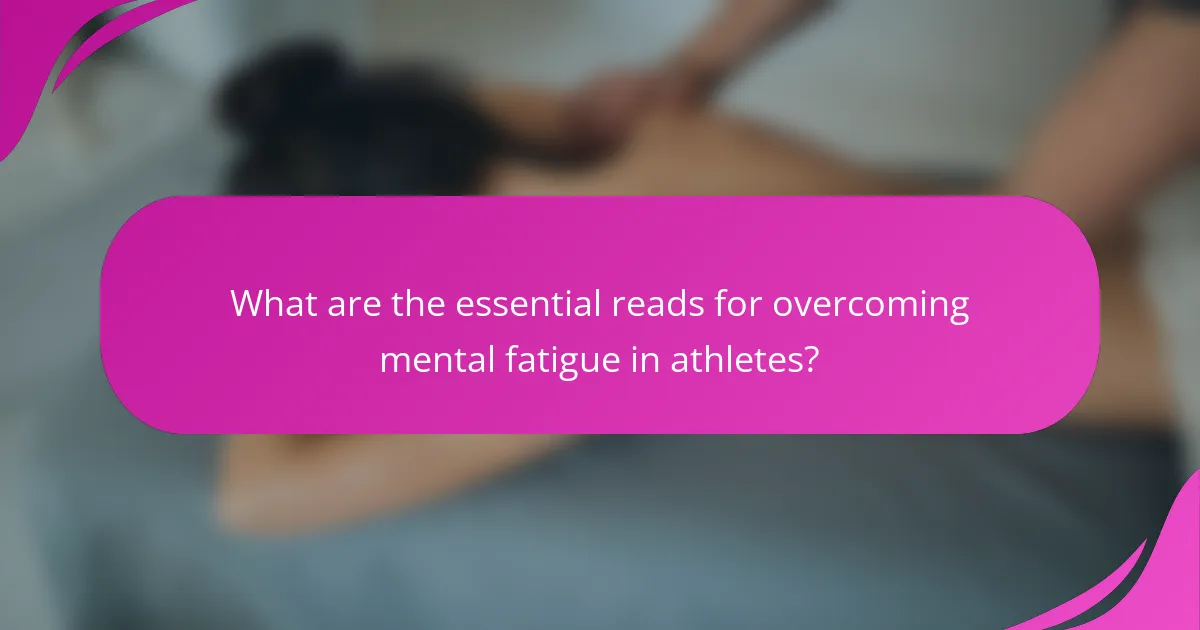Mental fatigue can hinder athletic performance, but specific books can provide essential strategies for overcoming this challenge. Explore insights from classics like “The Inner Game of Tennis” and “Mind Gym” that emphasise mental resilience and practical exercises. Discover how titles such as “The Champion’s Mind” and “Grit” offer unique perspectives on achieving a winning mindset. These essential reads equip athletes with tools to enhance focus, motivation, and overall mental well-being.

What are the essential reads for overcoming mental fatigue in athletes?
Reading specific books can significantly help athletes overcome mental fatigue. Here are essential reads that provide strategies, insights, and motivation for athletes facing mental challenges.
1. “The Inner Game of Tennis” by W. Timothy Gallwey – This classic focuses on mental aspects of performance, emphasising the importance of quieting the mind for better focus.
2. “Mind Gym: An Athlete’s Guide to Inner Excellence” by Gary Mack – This book offers practical exercises to enhance mental toughness and improve performance under pressure.
3. “The Champion’s Mind: How Great Athletes Think, Train, and Thrive” by Jim Afremow – It provides insights into the mental habits of successful athletes, helping readers develop a winning mindset.
4. “Relentless: From Good to Great to Unstoppable” by Tim S. Grover – Grover shares his philosophy on mental resilience and the relentless pursuit of excellence in sports.
5. “Grit: The Power of Passion and Perseverance” by Angela Duckworth – This book explores the role of grit in achieving long-term goals, essential for athletes facing mental fatigue.
These books equip athletes with the tools needed to navigate mental challenges and enhance their performance.
How do these books address mental fatigue?
These books provide strategies and insights to help athletes combat mental fatigue effectively. They emphasise mindfulness, resilience, and mental conditioning techniques. For example, “The Inner Game of Tennis” discusses mental focus, while “Mind Gym” offers practical exercises to enhance mental toughness. These approaches aim to optimise performance and recovery, making them essential reads for athletes facing mental fatigue.
What are the core themes found in these transformative books?
Transformative books for athletes focus on mental resilience, motivation, and personal growth. Core themes include overcoming adversity, developing a winning mindset, and enhancing focus. These books often emphasise self-discipline, the importance of rest, and strategies for managing stress. Additionally, they encourage reflection and self-awareness, which are crucial for long-term success in sports.
How do mindset and resilience play a role?
Mindset and resilience are crucial for athletes facing mental fatigue. A positive mindset fosters motivation, while resilience enables recovery from setbacks. Books focusing on these themes can provide strategies to enhance mental strength. For instance, “Mindset: The New Psychology of Success” by Carol S. Dweck emphasises growth mindset principles, while “The Resilience Factor” by Karen Reivich and Andrew Shatté offers practical tools for building resilience. Engaging with these resources can significantly improve athletes’ mental health and performance.
What strategies for recovery are commonly discussed?
Common strategies for recovery discussed in literature include mindfulness practices, structured rest periods, cognitive behavioural techniques, and nutritional optimisation. These approaches aim to enhance mental resilience and reduce fatigue in athletes. Mindfulness can improve focus and emotional regulation. Structured rest helps prevent burnout. Cognitive behavioural techniques can address negative thought patterns. Nutritional optimisation supports overall mental well-being.
Which authors are leading voices in mental fatigue recovery?
Prominent authors addressing mental fatigue recovery include Dr. Jim Afremow, Dr. Michael Gervais, and Dr. David Yeager. Their works provide insights into mental resilience and strategies for athletes. Dr. Afremow’s “The Champion’s Mind” emphasises mental training techniques. Dr. Gervais focuses on performance psychology in “Finding Your Edge.” Dr. Yeager explores growth mindset in “The Power of Believing That You Can Improve.” Together, these authors shape understanding of mental fatigue recovery in athletics.
What unique perspectives do these authors offer?
These authors provide unique insights into mental fatigue, focusing on resilience and mindset. They emphasise practical strategies to enhance mental strength, drawing from personal experiences and research. Their perspectives challenge conventional approaches, offering innovative techniques to combat fatigue. This fresh approach empowers athletes to optimise performance and maintain mental well-being.

What universal attributes do these books share?
These books share universal attributes that empower athletes to combat mental fatigue. They emphasise practical strategies, promote resilience, and offer psychological insights. Each book includes relatable anecdotes, actionable exercises, and fosters a growth mindset. Additionally, they highlight the importance of mental health in achieving peak performance.
How do they promote psychological well-being?
Books promote psychological well-being by offering insights, strategies, and inspiration for athletes facing mental fatigue. They provide practical techniques for stress management, enhance motivation, and foster resilience. Reading can serve as a therapeutic tool, allowing athletes to connect with their experiences and emotions, ultimately leading to improved mental health. Engaging with narratives of others’ struggles and triumphs also cultivates empathy and understanding, which are crucial for psychological growth.
What common methods for mental recovery do they suggest?
Common methods for mental recovery include mindfulness practices, cognitive behavioural techniques, and reading self-help books. These approaches help athletes manage stress and enhance focus. Mindfulness reduces anxiety through meditation and breathing exercises. Cognitive behavioural techniques reframe negative thoughts, promoting a positive mindset. Reading inspirational books offers new perspectives and coping strategies, contributing to overall mental resilience.

What unique attributes set these books apart?
The unique attributes that set these books apart include their focus on mental resilience, practical strategies for overcoming fatigue, and evidence-based insights tailored for athletes. They emphasise psychological techniques, incorporate real-life case studies, and provide actionable exercises to enhance performance and well-being. These elements collectively create a transformative reading experience that directly addresses the challenges faced by athletes dealing with mental fatigue.
How do personal anecdotes enhance their message?
Personal anecdotes enhance their message by creating relatability and emotional connection. They illustrate concepts in “Books That Will Change Your Life: Essential Reads for Overcoming Mental Fatigue in Athletes,” making the content more engaging. Anecdotes can provide unique insights into the challenges athletes face, offering practical examples of overcoming mental fatigue. This personal touch encourages readers to reflect on their experiences, fostering a deeper understanding of the material. Additionally, anecdotes can serve as motivational tools, inspiring athletes to apply lessons from the books in their own lives.
What innovative techniques are proposed for mental recovery?
Books that focus on mental recovery often introduce innovative techniques like mindfulness, cognitive restructuring, and visualization. These techniques help athletes manage mental fatigue effectively. Mindfulness practices enhance present-moment awareness, reducing stress. Cognitive restructuring allows athletes to reframe negative thoughts, fostering resilience. Visualization techniques enable athletes to mentally rehearse success, improving confidence. Integrating these methods into daily routines can significantly enhance mental recovery.

What are the rare insights offered in these essential reads?
Essential reads for overcoming mental fatigue in athletes provide rare insights through unique perspectives and strategies. These books often blend psychology with practical exercises, offering unconventional methods to enhance mental resilience. For instance, “The Inner Game of Tennis” emphasises self-awareness and focus, which are crucial for athletes. Another example, “Mindset” by Carol Dweck, introduces the concept of a growth mindset, transforming how athletes approach challenges. These insights not only address fatigue but also foster a deeper understanding of mental performance, making them invaluable for athletes seeking to elevate their game.
How do cultural perspectives influence mental fatigue recovery?
Cultural perspectives significantly shape mental fatigue recovery strategies for athletes. Different cultures emphasise various approaches, such as communal support or individual resilience, impacting recovery outcomes. For instance, collectivist cultures often promote group dynamics and shared experiences, enhancing motivation and emotional support. In contrast, individualistic cultures may focus on personal strategies like goal setting and self-discipline. Understanding these cultural influences can lead to tailored recovery methods that resonate with athletes’ backgrounds, ultimately improving their mental health and performance.
What uncommon strategies are highlighted for elite athletes?
Elite athletes often utilise uncommon strategies to combat mental fatigue, enhancing their performance. Techniques include visualization practices, mindfulness meditation, and strategic napping.
Visualization helps athletes mentally rehearse their performance, improving focus and confidence. Mindfulness meditation reduces stress and enhances emotional regulation, promoting resilience. Strategic napping can restore energy and improve cognitive function, allowing for better decision-making during competition.
Books that delve into these strategies, like “The Mindful Athlete” and “The Champion’s Mind,” provide insights into integrating these techniques into training. These resources emphasise the importance of mental strength alongside physical training in achieving peak performance.

What actionable advice can athletes apply immediately?
Athletes can immediately implement strategies from transformative books on mental fatigue. Focus on mindfulness techniques to enhance concentration and resilience. Incorporate visualization practices to improve performance under pressure. Establish a consistent routine for mental training alongside physical workouts. Prioritise rest and recovery as key components of overall performance.
What best practices should athletes follow for mental recovery?
Athletes should prioritise mental recovery by integrating practices from transformative books. These include mindfulness techniques, structured rest periods, and cognitive behavioural strategies. Regularly engaging with literature on mental resilience enhances understanding of mental fatigue and coping mechanisms. Incorporating these insights leads to improved focus and emotional balance.
What common mistakes should be avoided in recovery efforts?
To enhance recovery efforts, avoid these common mistakes: neglecting mental health, ignoring rest, and underestimating nutrition. Focusing solely on physical training can lead to burnout. Incorporate mental recovery techniques from transformative books to address fatigue. Prioritise holistic approaches for optimal recovery.
How can athletes create a tailored reading list for their needs?
Athletes can create a tailored reading list by identifying specific mental fatigue challenges and selecting books that address those needs. Focus on titles that offer strategies for resilience, motivation, and mental clarity.
Consider including works like “The Mind Gym” by Gary Mack for practical exercises, or “Peak Performance” by Brad Stulberg and Steve Magness for insights on mental toughness. Personalise the list based on individual preferences and learning styles.
Engage with a mix of genres, such as psychology, sports science, and autobiographies of successful athletes. This approach fosters a well-rounded perspective on overcoming mental fatigue.
Regularly update the reading list to include new releases and recommendations from peers. This ensures that the material remains relevant and impactful.